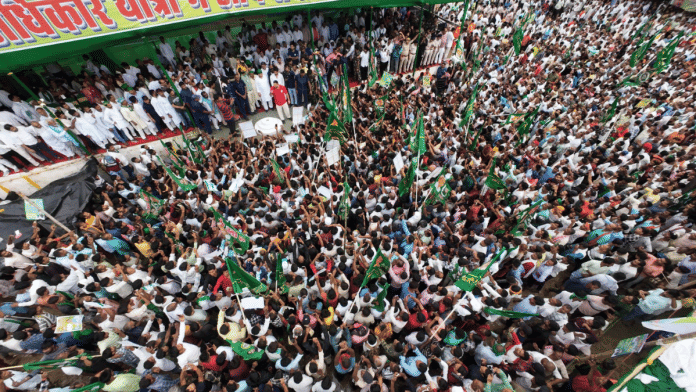Thank you dear subscribers, we are overwhelmed with your response.
Your Turn is a unique section from ThePrint featuring points of view from its subscribers. If you are a subscriber, have a point of view, please send it to us. If not, do subscribe here: https://theprint.in/subscribe/
As the second lockdown was removed and permits to move between cities was lifted, my wife, daughter and self, decided to explore the country in a car.
One such trip led us into Bihar.
Our first stop was Sasaram, a town at UP Bihar border. After passing Banaras, Sasaram looked tiny. The small hotel that we checked in was very basic. The old staff roster had disintegrated due Covid however, new ensemble staff was very energetic and helpful, we being the first guests after months of closure. The huge room was sprayed with sanitizer, even the bedsheets were damp. Later, angry voice of my daughter echoed in the hallway, approaching the room. She was checking us in at the reception and the staff produced a disclaimer form stating that we were not carrying alcohol and do not intend to drink. The bone of contention was my daughter’s signature, a working woman, being inadequate. The male had to counter sign. Poor guys had to undergo a crash course in gender equality. Prohibition and its consequences on the society was telling during our travels through Bihar.
Sasaram’s railway station was crowded with young boys with backpacks. The lockdown was lifted and these boys were rushing off to distant lands for employment.
There is a lovely and huge mausoleum of Sher Shah Suri which, is somehow missing from Insta reels!
Every time we got off the main highways into municipal limits, the roads were almost non-existent but the markets had these well-lit large mobile phones shops filled with young teenagers. Almost all the cities that we passed had small Malls, overflowing with goods.
Patna had this chaotic Kolkata feel to it. Ganga there was very serene and huge unlike what I had seen in Uttarakhand and UP all my life. Frantic and hurrying. Even the people of Bihar had this calm and slow demeaner unlike the breathless rush to nowhere what one sees in the county these days.
One of the stops was Robertsganj. The hotel suite was of one the largest that I have encountered in my travels. Four rooms with various designations. As my daughter settled in one of office cum drawing room for her WFH routine, wife and self, ventured out. We landed in a market with shops close to one another, raised on mud platforms. The passageways were narrow, good enough for bicycles or battery-operated Tak-Tak to pass. As my wife sat in a shop for Bihari saris something mentioned by the shopkeeper has stayed with me. Apparently, all the Saris were from Surat and Ahmedabad. Long ago men from Gujarat visited the area to understand the designs and market flavour. Then they came back in trucks with clothes, at half the rates. As the local looms started to die, the weavers and designers slowly went to Gujarat and now nothing is spun here. As I hear Prashant Kishore talking about the distress migration or labour trains from Bihar, I am reminded of that evening in Robertsganj.
Near Muzaffarpur, I took a wrong turn and ended up in a village deep inside the countryside. It was strange to see no one on the mudded small road. My wife got off to check. Later we came to know that the entire village had no able-bodied men. There were only children, old men women and young wives or daughters. The entire village was run by women in 30s or 40s. The houses were “hospital” clean, most of them were with brick walls. Limited livestock, neat and clean, were attached to each house. While wife and daughter were invited into one of the houses, I came across a young man standing on one leg, the other sole hooked to the knee of weight bearing leg. One stick in hand, he was the designated shepherd of the village. It became apparent that he was dim-witted so he remained in the village. One of thing he narrated that recently there was a fire in the village, it became very difficult to put it out as there were no men around. Relentless teams of women succeeded in the end, but by then half the village was destroyed, hence the newer brick houses.
Later, my wife mentioned about the loneliness the village wives experienced without their husbands around for decades. She knew the pain, being a “grass widow” herself! I hear these days about the highest gender ratio in voting pattern of Bihar. Pitilessly, It is mentioned as an indicator of “progressive” society or a vote bank.
Not once we felt unsafe while driving through Bihar. I have lived and worked with men from Bihar on merchant ships and always found them hardworking, diligent and with great sense of humour.
I often wonder why the state is left so far behind.
These pieces are being published as they have been received – they have not been edited/fact-checked by ThePrint.


